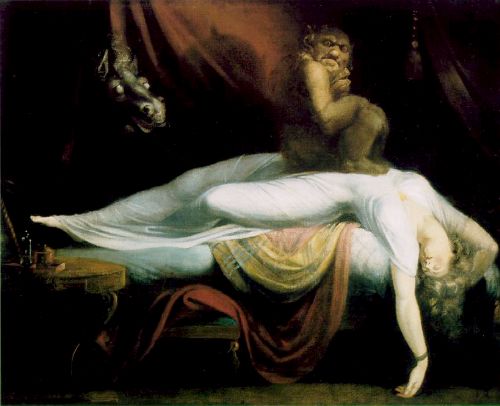
The Nightmare by Fuseli, 1781
There is, indeed, much confusion both in my own mind and in the popular culture about just what sleep is. The mystics, G.I. Gurdjiev and P.D. Ouspensky, do not lead us out of such difficulty, calling our normal "waking" states forms of sleep from which our life's work is to really awaken. Other esoteric traditions also speak of our not being genuinely awake until our "spiritual eyes" have been opened.
Nor do we find the language precise in relation to the main type of consciousness, of sorts, of which we have some awareness during or immediately following sleep, dreaming. We are told, for example, that "life is but a dream," again suggesting that we may awaken from how we experience existence. On the other hand, if to wake from this dream in which we are all presumably asleep is the same as dying, which as we have previously learned is the same as sleeping, it appears things are as yet in a muddle.
While still fairly young, I learned from my mom - who provided me with seven siblings but as a consequence often found herself extremely tired - that one can enhance the waking state with drugs, such as one's morning coffee or afternoon tea. The caffeine habit helped me cope with the insomnia. Just as well, for, during much of my growing up years after age seven, there were through the night multiple interruptions of slumber as a sister or brother gave noisy if inarticulate vent to extreme distress.
 The Nightmare by Fuseli, 1781 |
It is ironic that in my earlier years I hated most my "nap times." Too often they were interminable periods of torture when I could neither doze off nor engage in more productive or entertaining pastimes but must simply lie there as the clock clearly belied the oft uttered maxim: "Tempus fugit (Time flies)."
I say it is ironic because among the times for which I now have the most eagerness are those when I can at last nap. Some are able to subsist on half or less the sleep requirement of others even in the same family. One of my relatives barely gets five hours or less of "forty winks" a night and, if able to lie down in the afternoon, simply passes that time reading, for somnolence then is almost never required.
Yet I seem to need 7-8 hours of fully unconscious rest in each 24, or I am on edge, not at my best.
I know of others who typically go to bed by 10 PM and then do not arise till 10 AM, and the quiet periods alternating with snores from beyond their doorways give evidence of true slumber, not merely playing possum out of laziness or a lack of imagination.
Psychologists describe sleep as a healthy state of rest for mind and body that is periodic, involves at least partial loss of consciousness, and in which the eyes are are usually closed. There is decreased responsiveness to external stimuli. Brain wave cycles during sleep are associated with slow-wave vs. active sleep as well as dream states vs. dreamless sleep.
Humans are not the only animals with this sleeping peculiarity. It seems that mammals especially need rest. Oddly enough, animals that have (at least) two breasts also have to sleep. Presumably possession of the chromosomes for lactation is very enervating.
More seriously, fairly recent studies suggest that mammals which sleep more also have much better immune systems. The contrary is also true, for animals, like giraffes, which sleep only a few minutes daily (!) typically have just one-sixth the number immune cells of the real "snoozers," like armadillos, that may sleep all but four hours a day.
Sleep appears to serve other bodily repair and brain reorganizing or imprinting functions. Folks who sleep more on average tend to have more effective defenses against injury or disease, better memory, more creativity, and enhanced mental acuity. This does not explain my relative, though, who routinely gets by on several hours of zzz's a night less than I need and, even at age 88, retains her smarts, heals rapidly from traumas, and shows no signs of dementia.
Another idea about sleep has to do with the two hemispheres of our brains. The left hemisphere normally (in right-handed people) is associated with the functions, like planning, analysis, common sense logic, a sense of self, and awareness of where and who one is in relation to others or one's environment, that are most relevant to waking and active consciousness.
The right brain, on the other hand, is more about dreaming, creativity, intuition, feelings, and the processing of unconscious material and connections, things generally not so essential for our normal states of engaged awareness.
Perhaps, then, while awake we are acting out our more left brained selves, while in sleep it is the right brain which tends to hold sway.
Another quandary is what might be the differences between sleep and deep meditative or prayerful states. Those who claim success in the latter endeavors often maintain they are more a form of super-consciousness than of either waking or sleeping states. Yet how can we tell if these adepts are not simply involved in elaborate hypnotic states or in lucid dreaming?
It seems I have raised more questions than I have answered. Perhaps this is to be expected from a person whom some mystics declare is as yet not awake. Yet I wonder if they may not be dramatizing or over-analyzing the situation. Maybe it is all much simpler, and we need only: "Eat when hungry, sleep when tired (Hiakajo, Zen Master, on the meaning of Zen)."